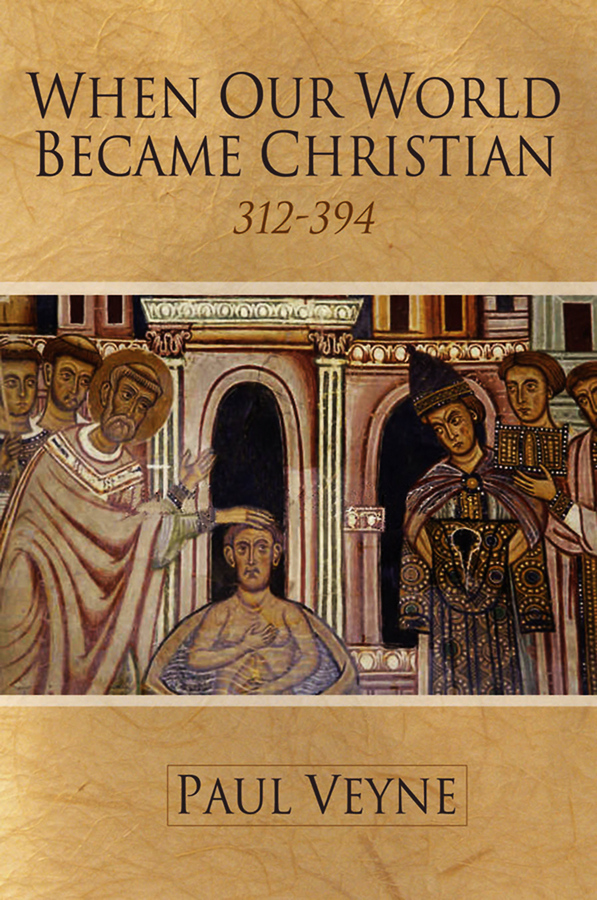Электронная книга: Paul Veyne «When Our World Became Christian. 312 - 394»

|
This short book by one of France's leading historians deals with a big question: how was it that Christianity, that masterpiece of religious invention, managed, between 300 and 400 AD, to impose itself upon the whole of the Western world? In his erudite and inimitable way, Paul Veyne suggests three possible explanations. Was it because a Roman emperor, Constantine, who was master of the Western world at the time, became a sincere convert to Christianity and set out to Christianize the whole world in order to save it? Or was it because, as a great emperor, Constantine needed a great religion, and in comparison to the pagan gods, Christianity, despite being a minority sect, was an avant-garde religion unlike anything seen before? Or was it because Constantine limited himself to helping the Christians set up their Church, a network of bishoprics that covered the vast Roman Empire, and that gradually and with little overt resistance the pagan masses embraced Christianity as their own religion? In the course of deciding between these explanations Paul Veyne sheds fresh light on one of the most profound transformations that shaped the modern world– the Christianization of the West. A bestseller in France, this book will appeal to a wide readership interested in history, religion and the rise of the modern world. Издательство: "John Wiley&Sons Limited"
ISBN: 9780745683348 электронная книга Купить за 5459.42 руб и скачать на Litres |
Другие книги автора:
| Книга | Описание | Год | Цена | Тип книги |
|---|---|---|---|---|
| Foucault. His Thought, His Character | Michel Foucault and Paul Veyne: the philosopher and the historian. Two major figures in the world of ideas, resisting all attempts at categorization. Two timeless thinkers who have long walked and… — John Wiley&Sons Limited, электронная книга Подробнее... | электронная книга |
Paul Veyne
Paul Veyne, born 13 June 1930 in
Biography
From an ordinary background, which he described as "uncultured", Veyne took up archaeology and history by chance, at the age of eight, when he discovered a piece of an
The family having moved to
Having come to Paris for his
On the other hand, the bad treatment of the Algerians at the hands of the colonials revolted him in equal measure to the atrocities of the Nazis. Once again, however, his shock was neither social nor political, but moral.
Paul Veyne studied at the École Normale Supérieure in Paris 1951-55. He was a member of the École française de Rome 1955-1957, whereupon he settled in Aix-en-Provence as a professor at the Université de Provence. It was in his years in Aix he published his provocative "Comment on écrit l'histoire", an essay in the epistemology of history. [ Paul Veyne "Comment on écrit l'histoire : essai d'épistémologie", Le Seuil 1970.] At a time when the dominant trend in French historiography favored quantitative methods, Veyne's essay unabashedly declared history to be a "true tale". Through his essay he became an early representative for the interest in the narrative aspects of scientific history.
His monograph on euergetism from 1975 ("Le pain et le cirque"), however, demonstrated that Veyne's concept of narrative somwhat differed from its common use, and that his differences with the hegemonic Annales school was smaller than what had seemed to be the case in 1970. [ Paul Veyne "Le pain et le cirque", Le Seuil 1976.] The book is a comprehensive study of the practice of gift-giving, in the tradition of
In 1975 Veyne entered the Collège de France thanks to the support of
In 1978 Veyne's epistemological essay was reissued in tandem with a new essay on
Paul Veyne now lives in
Bibliography
*"Comment on écrit l'histoire : essai d'épistémologie", Le Seuil, 1970.
*"Le pain et le cirque", Le Seuil, 1976.
*"L'inventaire des différences", Le Seuil, 1976.
*"Les Grecs ont-ils cru à leurs mythes ?", Le Seuil, 1983.
*"L'élégie érotique romaine", Le Seuil, 1983.
*"Histoire de la vie privée", vol. I, Le Seuil, 1987.
*"René Char en ses poèmes", Gallimard, 1990.
*"La société romaine", Le Seuil, 1991.
*"Sénèque, Entretiens, Lettres à Lucilius", revised translation, introduction and notes, Laffont, 1993.
*"Le quotidien et l'intéressant", conversations with Catherine Darbo-Peschanski, Hachette, 1995.
*"Les mystères du gynécée", in collaboration with F. Frontisi-Ducroux and F. Lissarrague, Gallimard, 1998.
*"Sexe et pouvoir à Rome", Tallandier, 2005.
*"L'empire gréco-romain", Le Seuil, 2005.
References
[This article is a translation of part of the article in French Wikipédia.]
External links
* [http://www.college-de-france.fr/default/EN/all/ins_pro/p1001869038511.htm Paul Veyne sur le site du collège de France]
Источник: Paul Veyne
См. также в других словарях:
Causes of World War II — World War II seriesv · d · e … Wikipedia
Diocletianic Persecution — The Christian Martyrs Last Prayer, by Jean Léon Gérôme (1883) The Diocletianic Persecution (or Great Persecution) was the last and most severe persecution of Christians in the Roman empire.[1] In 303, Emperor … Wikipedia
Italy — /it l ee/, n. a republic in S Europe, comprising a peninsula S of the Alps, and Sicily, Sardinia, Elba, and other smaller islands: a kingdom 1870 1946. 57,534,088; 116,294 sq. mi. (301,200 sq. km). Cap.: Rome. Italian, Italia. * * * Italy… … Universalium
Spain — /spayn/, n. a kingdom in SW Europe. Including the Balearic and Canary islands, 39,244,195; 194,988 sq. mi. (505,019 sq. km). Cap.: Madrid. Spanish, España. * * * Spain Introduction Spain Background: Spain s powerful world empire of the 16th and… … Universalium
Mithraic mysteries — Double faced Mithraic relief. Rome, 2nd to 3rd century AD. Louvre Museum The Mithraic Mysteries were a mystery religion practised in the Roman Empire from about the 1st to 4th centuries AD. The name of the Persian god Mithra, adapted into Greek… … Wikipedia
Christianity — Part of a series on Christianity … Wikipedia
